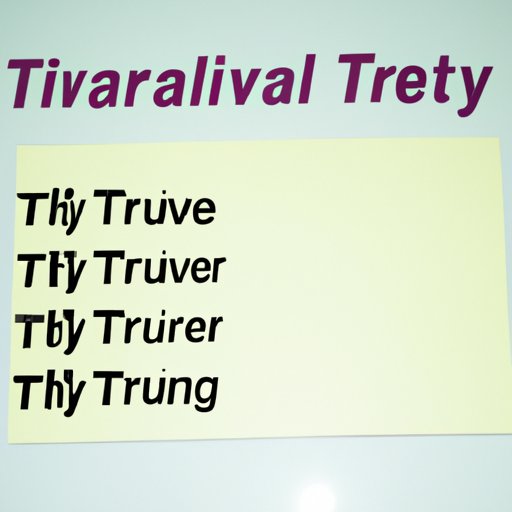Introduction
Writing for television is a challenging but ultimately rewarding career path. You could find yourself working on the next big hit show or developing your own series. Although it will take hard work and dedication to get there, you can achieve success as a television writer if you know where to start. This article explores the steps necessary to break into the world of TV writing.

Research the Different Types of TV Writing
Before you can start writing scripts, you need to understand the different genres and formats of television writing. Sitcoms, dramas, reality shows, and miniseries are just some of the many types of programs that are written for television. Each genre has its own set of rules and conventions, so it’s important to do your research before you start writing.
You can also find out more about TV writing by reading books, watching documentaries, and attending seminars. There are many online resources available that provide information on the basics of television writing. Many of these resources are free, so they can be a great way to get started.
Network with TV Writers and Producers
Networking is a key part of breaking into television writing. Connecting with experienced writers and producers in the industry can be invaluable when it comes to finding jobs and gaining experience. Research production companies in your area and attend events where you can meet people in the industry.
You can also join professional organizations such as the Writers Guild of America or the Academy of Television Arts & Sciences. These organizations offer networking opportunities and may even have job postings. If you can’t attend events in person, consider joining online groups or forums to connect with other writers.

Take Writing Classes or Get an MFA in Screenwriting
Taking courses or getting an MFA in screenwriting can be a great way to learn the basics of writing for television. Look for classes at local universities or community colleges that focus on scriptwriting or television writing. Many of these courses will cover topics such as story structure, character development, and dialogue.
You can also pursue an MFA in screenwriting or television writing. This type of degree program will give you a comprehensive understanding of the craft and will help you hone your skills. It will also give you the opportunity to network with other writers and professionals in the industry.
Write a Pilot Script and Submit It to Contests
Once you have a good grasp of the fundamentals of television writing, it’s time to start writing your own pilot script. Develop a concept for your show and begin writing the script. Be sure to read through it several times to make sure it’s polished and free of errors. You can also have friends or family members read it and provide feedback.
Once you’re satisfied with your script, submit it to writing contests or pitch festivals. These competitions allow you to showcase your work to industry professionals, who may be interested in your ideas. Even if you don’t win the contest, it can still be helpful in getting your work noticed.

Join a Writers Group or Workshop
Writers groups and workshops are a great way to get feedback on your work and collaborate with other writers. Look for local groups that meet regularly or join an online group. Workshops can also be beneficial, as they provide guidance from experienced professionals and allow you to get constructive criticism on your work.
No matter which option you choose, connecting with other writers can be invaluable when it comes to improving your craft and networking with industry professionals. Having a support system of fellow writers can make all the difference when it comes to achieving success in the world of TV writing.
Conclusion
Breaking into television writing is no easy feat, but it’s possible with the right approach. Research the different types of TV writing, network with experienced writers and producers, take writing classes or get an MFA, write a pilot script and submit it to contests, and join a writers group or workshop. With dedication and hard work, you can become a successful television writer.
(Note: Is this article not meeting your expectations? Do you have knowledge or insights to share? Unlock new opportunities and expand your reach by joining our authors team. Click Registration to join us and share your expertise with our readers.)
